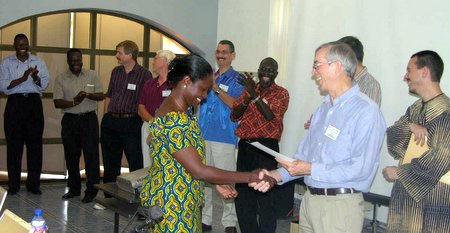|
||||
Improving Decisions with DSSATGaining skills in decision support systems has been a continuing priority for the DMP members. Following on an Ouagadougou workshop in June 2004 and another in Arusha during 23-28 August 2004, a training workshop was carried out during 23-29 October 2005 in Accra, Ghana. Thirty-four DMP members and other participants learned how to use the DSSAT (Decision Support System for Agrotechnology Transfer) computer model to help resolve complex crop management decisions. Many weather, soil, genetic and management factors affect the way a crop will respond to irrigation, fertilizer and other management practices. Determining appropriate crop management strategies under these uncertainties has major economic and environmental implications. A new version of DSSAT The new Windows-based version 4 of DSSAT is a suite of simulation models of the soil/plant/atmosphere system that can help scientists understand the processes that determine crop responses and predict crop performance, resource use and environmental impacts for different environmental and management scenarios. The models can also help elicit the potential impact of climate change on crop production and on long-term soil carbon sequestration, and provide management scenarios for adapting to climate variability. The workshop trained participants in the use of the new DSSAT version 4 and its new Cropping System Model (DST-CSM). CSM is comprised of the CROPGRO module for soybean, peanut, common bean, chickpea, faba bean, cowpea, and other grain legumes; the CERES module for maize, sorghum and millet; the CERES-Rice module for rice; the SUBSTOR module for potato; the CROPSIM-CERES module for wheat and barley; and the CROPGRO module for tomato, bahiagrass and brachiaria grass. The CENTURY model for the simulation of soil carbon and nitrogen is also included in CSM. What participants did
The training course gave participants the opportunity to work with their own data and determine the accuracy of the models on specific problems. It helped them assess economic risks and environmental impacts associated with agricultural production, and to link socio-economic analysis with biophysical models. (Photo: Dr Jim W. Jones, University of Florida presents certificate of course completion to Dr Seraphine Sawadogo-Kabore of INERA-Burkina Faso). Workshop organization The workshop was carried out under the auspices of the International Consortium for Agricultural Systems Applications (ICASA). It was conducted by decision support system experts Dr. G. Hoogenboom of the University of Georgia; Dr. J. W. Jones, University of Florida; and Dr. P. S. Traore, ICRISAT. It was organized by Dr. Andre Bationo of the African Network for Soil Biology and Fertility (AfNet) of the Tropical Soil Biology and Fertility (TSBF) institute of CIAT, and Dr. Ramadjita Tabo of ICRISAT through the Challenge Program on Water and Food - Volta Basin (coordinated by ICRISAT) and the Desert Margins Program.
Return to On the Edge table of contents
|
||||
|

 The training covered the science embedded in the models; the
minimum data requirements and experimental data collection for
systems simulation; the integration of crop simulation models with
database management; and the application of the new DSSAT-CSM model
to improve the management of cropping systems.
The training covered the science embedded in the models; the
minimum data requirements and experimental data collection for
systems simulation; the integration of crop simulation models with
database management; and the application of the new DSSAT-CSM model
to improve the management of cropping systems.